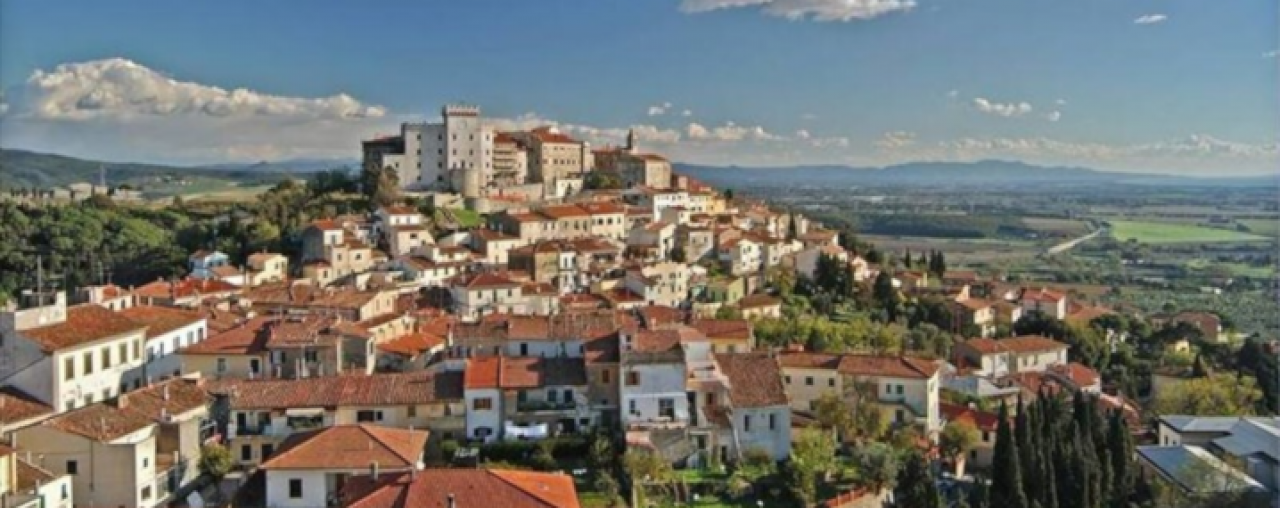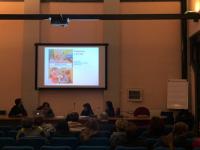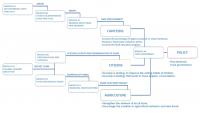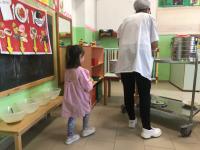
On the 17th of April, at the conference hall of the municipality of Rosignano Marittimo, the project BioCanteens was officially presented to the city. Citizens, associations, companies, non-profit organizations and institutions which, in terms of skills, interests and needs, are in line with the objectives of the project to transfer BioCanteens good practice were invited to the meeting.
BioCanteens opens to the city!
During the event, the offices of the Personal Services and Business Sector presented the project to the audience and explained the objectives that Rosignano-Marittimo municipality will target in the next two years. The event was concluded at the end of the Transfer Plan drawing up process, which saw the municipal offices and the main actors of the ULG (Urbact Local Group) co-construct each other on methodologies and strategies to be adopted for the transfer of good practice at the local level.
The ULG and the transfer plans as implementation tools for the good practice:
The Transfer Plan is a strategic document that defines needs, analyses problems and opportunities and proposes feasible and sustainable solutions related to the transfer of good practice. Each partner city must draw up its own Transfer Plan which must contain the roadmap and the detailed plan of actions and activities to be implemented at local level.
The Urbact Local Group (ULG) is a working group organised by each partner city and involving the main actors (associations, companies, public and private bodies, citizens and committees) present in the city that, in terms of competence and knowledge, are useful for the implementation of the good practice. The implementation of this good practice is the main objective of an Urbact Local Group and carries out the activities and strategies contained within the transfer plan.

After a brief introduction to the project by the manager Angela Casucci, the presentation moved on to the illustration of the Transfer Plan and the description of the objectives and strategies that Rosignano Marittimo will put in place for the next two years. Giuseppe Schiavone, Local Project Coordinator, illustrated those which will be the next steps for the implementation of the transfer process. At the end, two brief interventions by the Educational Services and Agriculture and Commerce offices presented the activities carried out during the first and second transnational meetings in Mouans Sartoux and Torres Vedras.
A project with and for the whole city.
In a perspective of a modular and collaborative approach to the transfer process, Rosignano Marittimo built his road map redefining the scale of goals to be achieved based on the 8 transfer modules underlying the BioCanteens ecosystem.
On the graph below, we can see how the process was designed by identifying 4 main macro-areas of intervention with related objectives. The macro-areas identified are: School canteens, Citizens, Agriculture and Politics. Each macro-area has a series of intermediate steps that, connected to each other allow to reach specific results for each area that contribute, in turn, to the achievement of the final project objective, the creation of a strategy of territorial Food Governance that projects Rosignano Marittimo over the 24 months of the project.

The specific goals that we set ourselves to achieve for each macro-area are:
- School canteens: increase the percentage of organic products, develop a food waste reduction policy, increase the food education program.
- Agriculture: strengthening the network of local farms, encouraging the creation of agricultural networks and new businesses.
- Citizens: develop a strategy to improve the eating habits of families, develop a strategy that leads to greater consumption of organic and local products.
- Policy: planning of a long-term territorial food governance
A European opportunity to stimulate the local dialogue:
BioCanteens Transfert Network is an excellent opportunity to stimulate the dialogue between administrations and stakeholders on the local level. A dialogue that allows to identify needs to try to give concrete and feasible answers by rethinking BioCanteens good practice and adapting it to the local context. In Rosignano-Marittimo’s case, for example, the idea of creating a municipal farm to supply organic products to school canteens kitchens has been redesigned. The idea that emerged during the preparation of the local transfer plan was to create a Rural Hub.
What Rosignano Marittimo’s Rural Hub should be? A space for the exchange of experiences and knowledge aimed at strengthening the local agricultural system in order to structure a platform that, in the future, will be able to support the food need of Rosignano Marittimo, to generate new jobs and increase organic production. A Rural Hub composed of: local farms, distribution centers, representatives of agricultural associations, research and development bodies and representatives of large and small distribution. This is an example of how to "rethink and adapt" a good practice at the local level.
The BioCanteens project has among its objectives the creation of a catalog of 25 micro-actions or activities, called KMGPs (Kitchen Micro-Good Practices), which are useful for the sustainable management of school canteen kitchens, easily adaptable to any canteen.
Among the activities already started to follow up on the transfer process, we point out the implementation of one of the KMGPs linked to the monitoring of food waste at the end of the meal in school canteens. This activity has a dual function, on the one hand it allows timely intervention on the canteen menu, modifying and adapting meals to the children’s tastes, and in on the other hand to quantify in terms of weight, and in terms of money the food waste that results.

The meeting of April 17th was a first moment of dialogue and confrontation with the city, to clarify the future challenges for our territory. For the coming months a series of meetings of our ULG are scheduled, alternating between various transnational meetings planned at the network level. A total of 18 ULG meetings are scheduled over the 24 months.
Contacts:
Giuseppe Schiavone – biocanteens@comune.rosignano.livorno.it

